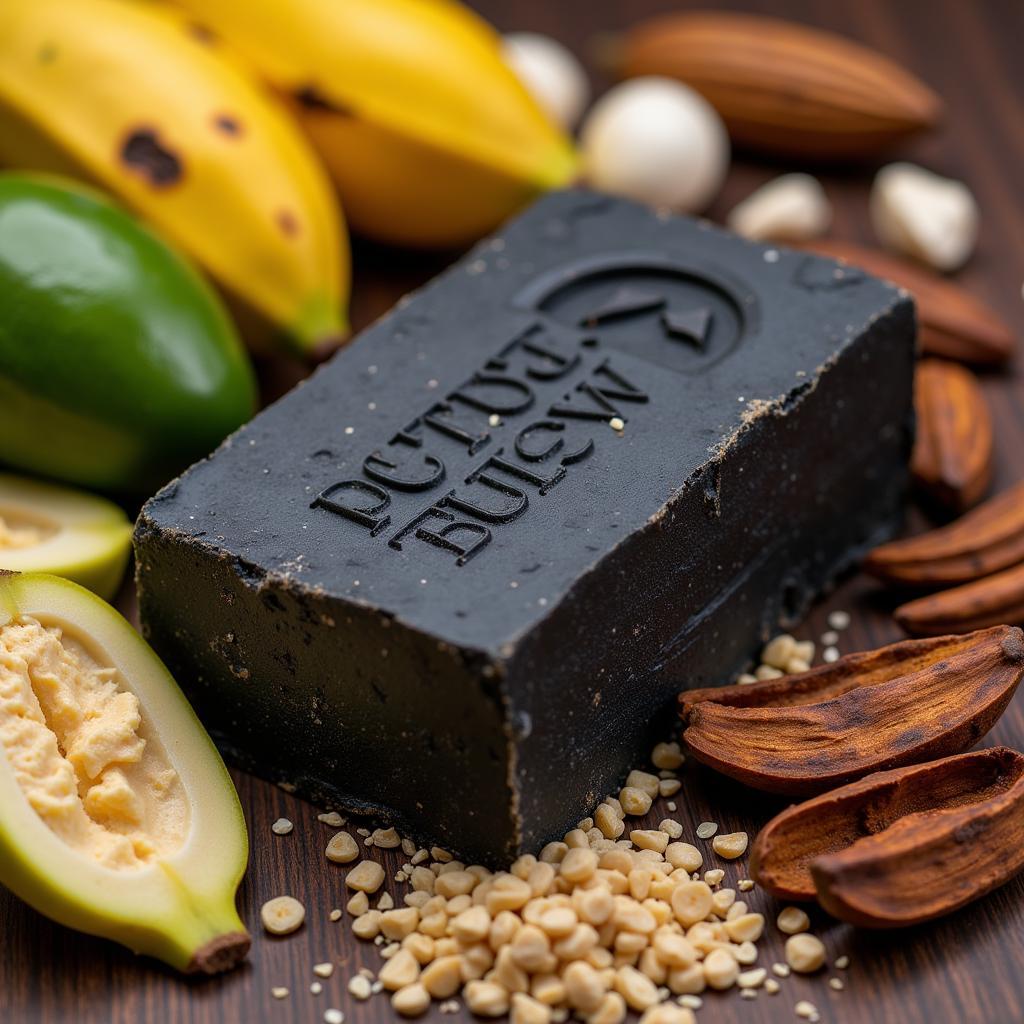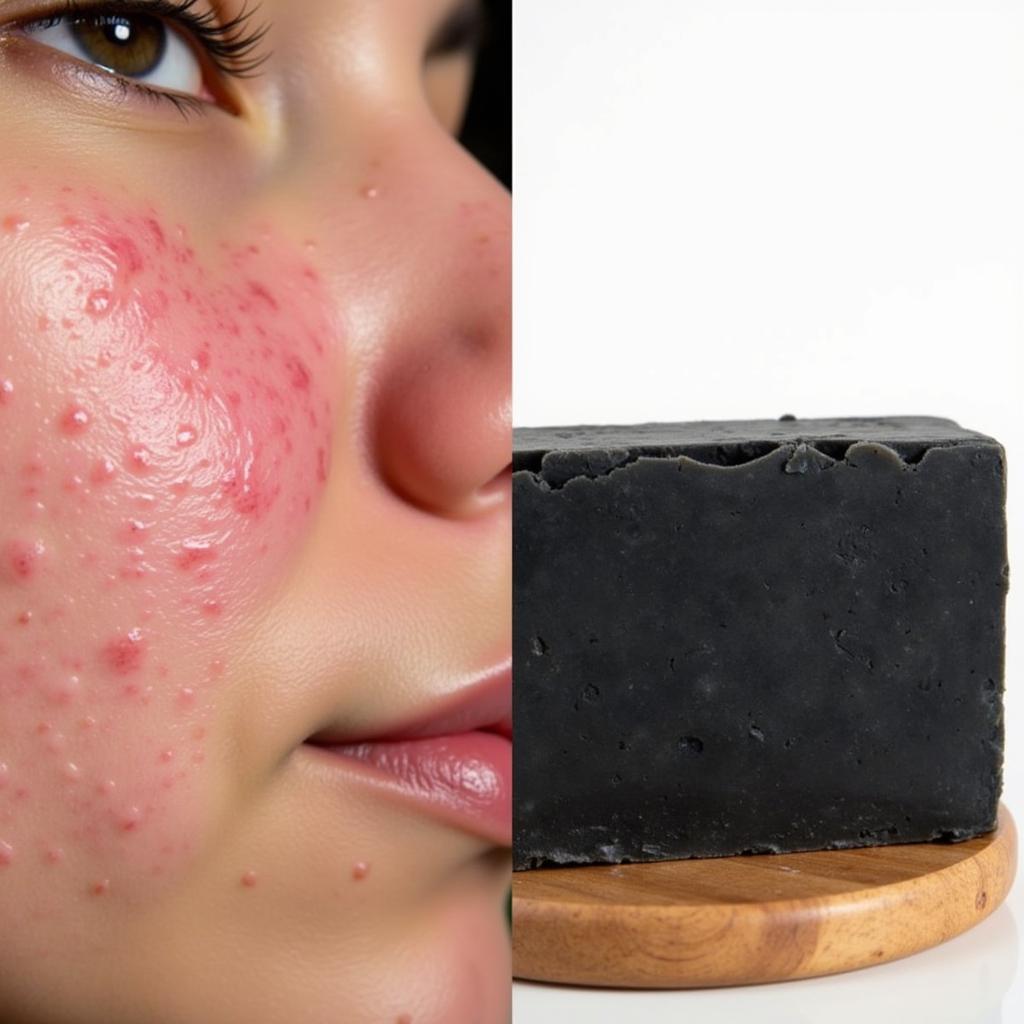Can African Black Soap Make Acne Worse?
African black soap is often touted as a natural remedy for acne, but can it actually make breakouts worse? The answer, like many things in skincare, is complicated. While this traditional soap boasts numerous benefits for some, it can have adverse effects on others, especially those with acne-prone skin. Let’s delve into the world of African black soap and its impact on acne.
Understanding African Black Soap and Its Ingredients
 African Black Soap Ingredients
African Black Soap Ingredients
Authentic African black soap, originating from West Africa, is handcrafted using time-honored methods passed down through generations. Unlike commercially produced soaps, its ingredient list is refreshingly simple, typically consisting of:
- Plantain peels: Rich in vitamins A and E, antioxidants known to soothe and heal the skin.
- Cocoa pods: Abundant in antioxidants and natural emollients that can help retain moisture.
- Shea butter: A deeply moisturizing fat renowned for its anti-inflammatory properties.
- Palm oil: A source of vitamins A and E, contributing to the soap’s nourishing qualities.
The exact recipe may vary depending on the region and the maker, often incorporating additional ingredients like honey, aloe vera, or essential oils for their therapeutic properties.
Why African Black Soap Might Help Acne
African black soap’s potential benefits for acne stem from its unique blend of natural ingredients:
- Deep Cleansing: The soap’s lather, while gentle, effectively removes dirt, excess oil, and impurities that can clog pores and contribute to breakouts.
- Antibacterial Properties: Ingredients like plantain peel and cocoa pods possess natural antibacterial and antifungal properties, potentially helping to combat acne-causing bacteria.
- Anti-inflammatory Action: Shea butter, with its renowned anti-inflammatory properties, may help calm irritated skin and reduce redness associated with acne.
- Exfoliating Effects: The slightly grainy texture of raw, unprocessed African black soap can provide gentle exfoliation, removing dead skin cells that can clog pores.
Why African Black Soap Might Make Acne Worse
While the natural properties of African black soap seem promising for acne, several factors can turn it into a foe for those with sensitive or reactive skin:
- High pH Level: Traditional African black soap tends to be alkaline, with a pH level higher than the skin’s natural slightly acidic pH. This can disrupt the skin’s barrier function, leading to dryness, irritation, and potentially worsening acne.
- Harsh Exfoliation: While gentle exfoliation can be beneficial, the raw, unprocessed form of African black soap can be too abrasive for some, causing micro-tears in the skin and exacerbating acne.
- Ingredient Sensitivity: Certain individuals may be sensitive to specific ingredients in African black soap, such as shea butter or certain essential oils, leading to allergic reactions or irritation.
- Drying Effects: While some ingredients are moisturizing, the overall effect of African black soap, particularly when used frequently, can be drying, especially for those with naturally dry or dehydrated skin. This dryness can trigger the skin to produce more oil, potentially leading to increased breakouts.
 African Black Soap and Acne
African Black Soap and Acne
How to Use African Black Soap Safely and Effectively
If you’re considering incorporating African black soap into your skincare routine, especially if you have acne-prone skin, proceed with caution and follow these tips:
- Choose Authentic Soap: Opt for raw, unrefined African black soap from a reputable source, ensuring it’s free from harsh chemicals, fragrances, and artificial colors.
- Patch Test First: Before applying to your entire face, perform a patch test on a small area of skin to check for any adverse reactions.
- Lather in Hands: Always lather the soap in your hands before applying it to your face to minimize harsh scrubbing.
- Don’t Overuse: Limit use to once or twice a week, especially if you have sensitive or dry skin.
- Moisturize Well: Always follow up with a moisturizer to replenish hydration and support the skin’s barrier function.
- Listen to Your Skin: Pay close attention to how your skin reacts. If you experience any excessive dryness, irritation, or worsening of acne, discontinue use.
Expert Insights on African Black Soap and Acne
“While African black soap holds cultural significance and boasts anecdotal benefits, its high pH and potential for irritation make it a risky choice for acne-prone skin,” says Dr. Abena Osei, a dermatologist specializing in ethnic skincare. “If you’re determined to try it, proceed with caution, choose a gentle formula, and prioritize hydration.”
Conclusion
African black soap’s impact on acne is multifaceted and depends on individual skin type and sensitivities. While its natural cleansing, antibacterial, and anti-inflammatory properties may benefit some, its high pH, potential for dryness, and risk of irritation can exacerbate acne in others. Approaching this traditional soap with a cautious and informed perspective is crucial. If you’re unsure about its suitability for your skin, consulting a dermatologist is always recommended. Remember, achieving clear skin often involves a personalized approach, and what works for one person may not work for another.




